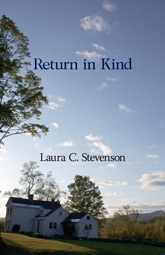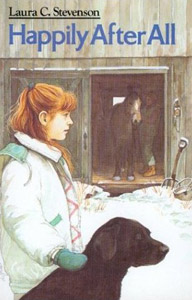A New Series: One Minute Reviews of
Books by Vermont Authors
Laura's column "One Minute Reviews" has appeared bi-weekly in Wilmington, Vermont's Deerfield Valley News since 2015. In April 2018, she found that no Vermont periodical consistently reviews all commercially published fiction and non-fiction by Vermont authors, so she started a series to fill that void. Published reviews from that series and some earlier reviews of local authors are listed with links to a scan of the printed copy. Reviews still in queue are listed without links until they appear in print.
The books reviewed in this series are available through Wilmington's Pettee Memorial Library, the Whitingham Free Public Library, and locally owned Bartleby's Books in Wilmington.
Sue Halpern, Summer Hours at the Robbers Library. Harper Perennial, 2018.
The Robbers Library in the title has nothing to do with robbery. At least, not directly. In Halpern's fictitious history, it's the Robers Library, founded in 1912 by Albert Robers, the nineteenth century entrepreneur who made the town of Riverton, New Hampshire into a mill town on the banks of the Connecticut River. The mill hands bitterly made the obvious play on words, and their name stuck; historical rumor says they took the founder's name off the building "three seconds after he died." But that's all in the past. A century later, the mills have closed, the crumbling downtown is deserted, and ironically, the handsome Robbers Library is now the only monument to the town's bygone industrial era. The library's reference librarian is Kit Jarvis, a woman in her forties who has lived in Riverton for four years under a changed name, and who, for all her competence and intelligence, has no friends but books. At the beginning of summer, she is put in charge of Sunny Arkinsky, the fifteen-year-old daughter of two latter-day hippies, who has been sentenced to twelve weeks of community service for shoplifting a hardback Webster's Dictionary. Soon she and Kit begin to share their interest in books&em;and also their interest in Cyrus Ingram Allen (Rusty), whose career as a high-flying Wall Street entrepreneur has ended with a crash. Gradually, Kit opens herself to the two others, and the three of them form a kind of family.
In less experienced hands, this plotline would be predictable and sentimental. Halpern, however, keeps her readers' interest by skillfully varying points of view, while simultaneously moving back and forth in time. The technique has its dangers. In particular, the book opens with Kit's first-person narrative of her college affair with her ex-husband, a prologue that later proves to be the first of several reflections on her failed marriage. As an opening, however, it promises a book very different from the one that follows. Subsequently, however, the technique allows Halpern to show us Kit's various sides, from the frozen third-person narrator of her librarian days, to her witty, defensive performance in her dialogues with her psychiatrist, to her progressively frozen first person voice as she looks back to a past trauma skillfully kept from us until the end. Against Kit's voice, Halpern plays Sunny's, usually in the first person, alternately recalling the off-the-grid passions of her parents and exploring the completely different world of Kit and Rusty. While readers familiar with Young Adult Fiction may find Sunny's voice and perceptions a little young for fifteen, her changing points of view allow for nuanced character development that is alternately amusing and sad. The depth with which the two women are developed more than balances Rusty's more stereotypical third-person narrative as he searches for a world whose values revolve around something other than money.
Behind these characters looms the steady, handsome, understaffed presence of the library, which in the absence of other culture in Riverton, becomes not just an intellectual center but a gathering place. The minor characters who meet here, particularly the comic quartet of retired men who appear regularly each morning and leave when the hospital café (the only restaurant in town) opens for lunch. The two librarians who share Kit's work in the library are also convincingly drawn. The quotations from various authors that are interspersed throughout the book remind us again and again of the value of libraries, of literature, and of bookworms.


